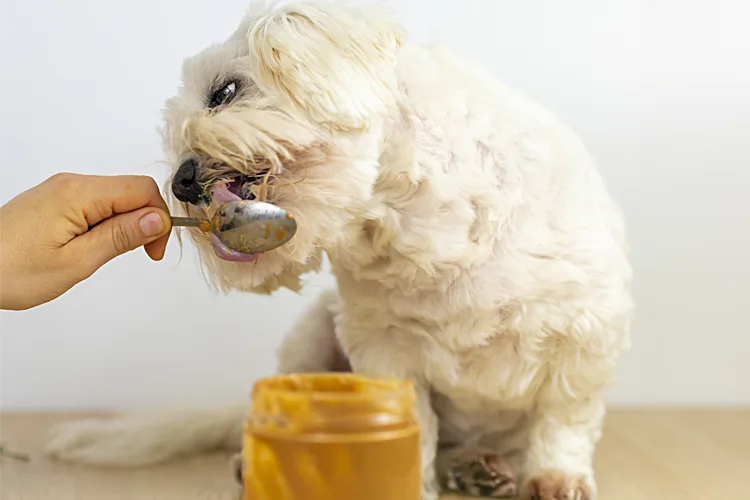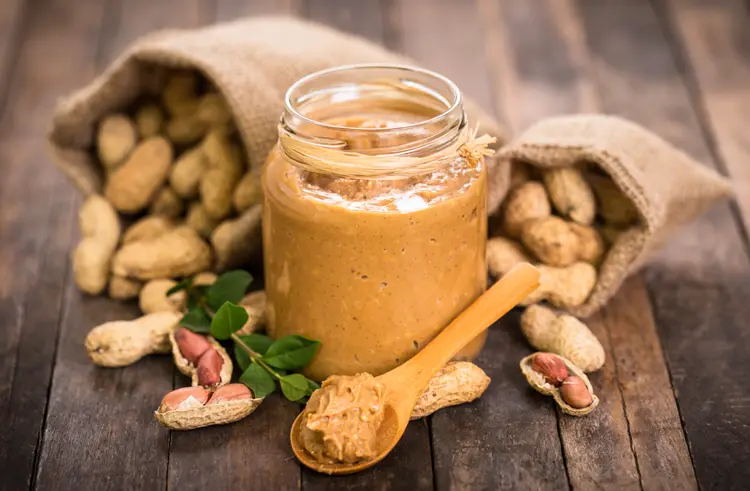Home Page › Blog › Peanut Butters That Are Dangerous for Dogs
Peanut Butters That Are Dangerous for Dogs

Hey there, dog lovers! Have you ever wondered if sharing your peanut butter sandwich with your furry friend is okay? In this article, we’ll dig into what science has to say about dogs and peanut butter.
Peanut butter: a yummy treat for dogs?
Most dogs wag their tails at the smell of peanut butter. It’s not just tasty but can also be a good source of protein, healthy fats, vitamins B and E, and niacin for our four-legged friends. But hold on! Not all peanut butter is safe for dogs.
The Good Stuff: Safe Peanut Butter for Dogs
When picking peanut butter for your pooch, go for the plain, unsalted ones. These are the best because they don’t have extra stuff that can be bad for dogs. Some good brands that are dog-friendly include:
- Whole Foods 365 Everyday Value Organic Peanut Butter
- Trader Joe’s Peanut Butter (No Salt)
- Teddie Super Chunky Peanut Butter
- Poochie Dog Peanut Butter
- Smucker’s Natural Peanut Butter
- Teddie All Natural Peanut Butter
- Crazy Richard’s Peanut Butter
While both chunky and smooth peanut butter are generally safe for dogs, smooth is often a safer choice. Chunky varieties can pose a choking hazard, especially for smaller dogs.
Another wonderful alternative is to make your own peanut butter! It’s quick and easy. Start by roasting 2 cups of shelled and skinned peanuts in an oven at 350 degrees Fahrenheit for about 10 minutes until they are lightly browned. Let them cool slightly, then transfer them to a food processor. Blend for about 5 minutes or until the mixture becomes smooth and creamy. You and your dog can enjoy your healthy, homemade treat!
Warning: Xylitol is a No-No!
Now, this is super important. Some peanut butter use a sweetener called xylitol. This is very dangerous for dogs, even in small amounts. It can cause low blood sugar, seizures, liver failure, or even death. So always check the label to make sure there’s no xylitol.
The following peanut butter brands have been known to contain xylitol:
- Go Nuts, Co.
- Krush Nutrition
- Nuts ‘N More
- P28 Foods
How much is too much?
Even with safe peanut butter, remember it’s a treat, not a meal. Giving your dog too much can lead to weight gain and other health issues. A little dab on their toy or a small spoonful as a treat is plenty.
Benefits of Peanut Butter for Dogs
Apart from being a yummy snack, peanut butter can be a handy tool. It’s great for hiding medicine or stuffing in dog toys to keep them busy. It also has healthy nutrients, like those fats and vitamins we discussed.
Peanut butter can be an effective training tool. Its strong smell and taste are very appealing to dogs, making it a high-value reward during training sessions. Just remember to use it sparingly!

When to Avoid Peanut Butter
If your dog is overweight, has allergies, or has a sensitive stomach, it’s best to skip the peanut butter. And always, no xylitol! In addition, just because a peanut butter is xylitol-free, it isn’t necessarily healthy for your dog. Popular store brands like Jif, Skippy, Smuckers, and Peter Pan are all xylitol-free, but they can contain sugar, preservatives, and other unhealthy ingredients for your dog.
These ingredients might be okay in moderation, but overconsumption can lead to obesity or diabetes. Also, don’t take too much comfort in a label reading “natural” or “organic”; these peanut butter can still contain copious amounts of these ingredients.
Just like humans, be aware that some dogs can be allergic to peanuts. Signs of an allergic reaction include itching, redness, swelling, and gastrointestinal issues.
Conclusion: Peanut Butter Can Be a Pawsome Treat!
So, can dogs eat peanut butter? Yes, but be smart about it. Choose natural, unsalted, xylitol-free peanut butter. Use it as a special treat, not a regular part of their diet. This way, you and your furry friend can enjoy peanut butter safely and happily!
Remember, when in doubt, ask your vet. They know what’s best for your dog. Happy snacking!
About the Author: The writing team at Service Dog Certifications is made up of folks who really know their stuff when it comes to disability laws and assistance animals. Many of our writers and editors have service dogs themselves and share insights from their own experiences. All of us have a passion for disability rights and animals.
Latest Posts

How to Bring a Service Dog to Disneyland
Trained service dogs are more than welcome to join their handlers at Disneyland. In this guide, we’ll explain Disneyland’s policies and give practical advice for bringing a service dog to Disneyland for the first time. Disneyland’s Service Dog Policies The Magic Kingdom is happy to welcome trained service dogs across most park locations! They kindly […]

Read More

Can Dogs Eat Tomatoes?
Yes! Dogs can safely enjoy tomatoes, but there are a few risks to be aware of so you can feed your dog responsibly. Fully ripe tomatoes (without the stems and leaves) can actually have nutrients that are good for your pup. Tomatoes have chlorogenic acid, an antioxidant that can have anti-inflammatory effects in cells. They’re […]

Read More

Can a Primary Care Doctor Write an ESA Letter?
Your family doctor, also called a primary care physician (PCP), can write a letter recommending an emotional support animal. We’ll explain what legally gives them that ability and explore what better options might be available for you. Why are Physicians Able to Write an ESA Letter? To turn your pet into an emotional support animal, […]

Read More





